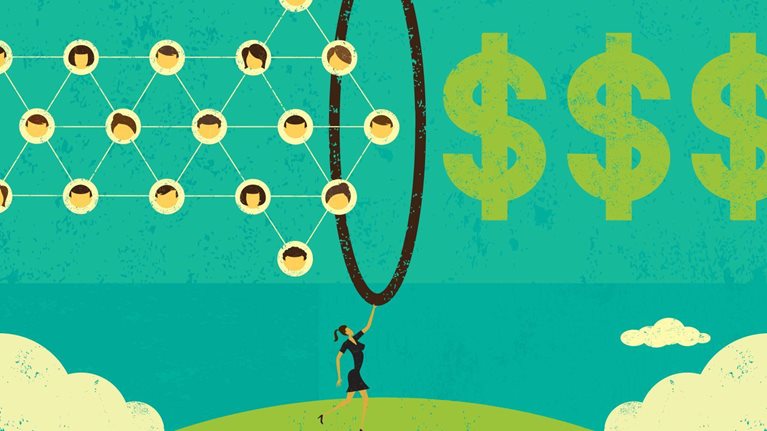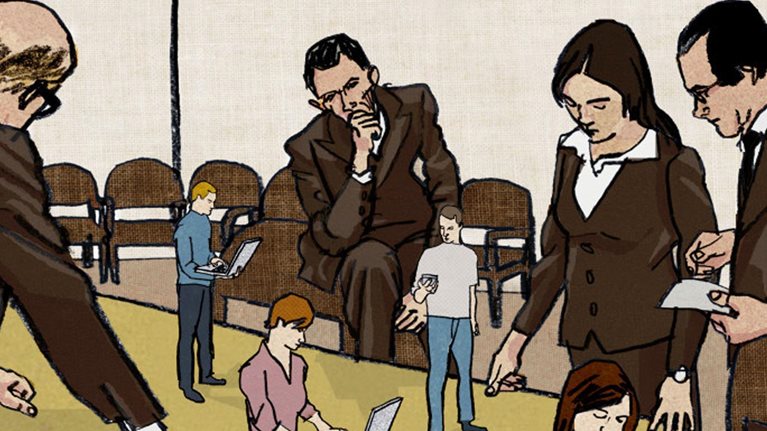As business leaders seek to stay ahead of the curve, they should ensure that somewhere in their range of view are the ideas of economists. Not forecasts or models or the dry parade of graphs and equations found in the typical introductory textbook, but rather economists’ insights and ideas, which sometimes have an enormous impact on the evolution of industries and also have been put to use in very practical and profitable ways by real companies. I am an economist, so this assertion may seem a bit self-serving. But I wouldn’t make it if there weren’t powerful evidence in its corner.
In this article, I’ll focus on one example: the Internet economy we know today would not have been possible, in scale or in speed of adoption, without an extremely important policy development of the 1970s and 1980s—the deregulation of transportation—in which economists played an important role. Nor would the business model of two of the Internet’s well-known players have been possible without the embrace of an idea—auctions—that has its roots deep in economics. I don’t think the Internet is an isolated case. I’ll close with an example of how a big economic idea could, in the future, have major implications for another major industry: pharmaceuticals.
Transportation deregulation
Had the transportation industry not been deregulated in the 1970s and early 1980s, and had the much more efficient and flexible systems built by companies such as UPS not emerged in response to competition, it is difficult to see how Internet retailers like Amazon, which came along roughly two decades later, would have been able to get started or succeed. Amazon would have had to begin with its own fleet of trucks or even planes to escape the strictures of the pre-1980 regulatory regime, a barrier to entry that almost certainly would have been impossible for new retailers to overcome.
The deregulation of prices and of entry into the transportation industry—especially interstate cargo air traffic and trucking in the mid to late 1970s—is an exciting story in retrospect, but its importance would have been easy to miss at the time. As such, it is a useful reminder for business leaders of the value of keeping their ears to the ground when big economic ideas are playing out in policy arenas. That this particular dismantling of economic regulation happened at all is an amazing fact that contradicts one widely held notion of political economy: a policy benefiting large numbers of people and businesses in a small way is unlikely to be adopted if it imposes large harm on a small, concentrated number of other individuals and businesses.
Air cargo and trucking fit this description to a T. Economic regulation artificially suppressed competition and kept prices of freight (and passenger) traffic too high. But since freight costs represent only a small fraction of the costs of any retail operation and are not separately broken out, consumers paid only a little bit more than they otherwise might. Moreover, even if consumers knew this, they were too diffuse to oppose the concentrated lobbying efforts of the firms in the transportation industry (and its workforce), which would have been hurt greatly by additional competition. That was true even if the price for keeping it at bay had to be price regulation.
How then did things change in the United States? The starting point was congressional hearings organized by the late Senator Edward Kennedy and his chief staffer on these issues, Stephen Breyer (currently a Supreme Court Justice). The hearings featured economic research that made clear the large price cuts to be expected from dismantling price and entry controls in the airline industry. When Jimmy Carter was elected president, he joined forces with Kennedy (and senators whom Kennedy recruited to the cause) to push deregulation. Carter started with the appointment of two prominent economists, the late Alfred Kahn (as chairman) and Elizabeth Bailey, to the Civil Aeronautics Board, which oversaw the airline industry.
Airline deregulation passed Congress in 1978. Once the deregulation ball was rolling, it next went to the trucking industry, whose prices and routes were just as strictly controlled, even though there were thousands of firms in the industry. Trucking deregulation came in 1980, with the help of some heavy pushing along the way by the Interstate Commerce Commission, headed by another highly regarded economist whom Carter had appointed as chairman (on Kahn’s recommendation): Darius Gaskins. The bottom line is that neither deregulation success would have been possible without many years of prior economic research and, most likely, without articulate economists such as Kahn, Bailey, Gaskins, and the economists they appointed to key regulatory positions. When the stars align in this way, it’s worth paying attention.
Auctions
Economists and their ideas also have had an important impact on the evolution of the Internet directly, not mediated by policy changes, through their championing and theorizing about auctions. In the early 1900s, the whole notion of how prices are set in a market economy was analogized to an auctioneer, since frequently referred to as a “Walrasian auctioneer” in the academic literature. The auctioneer conducts continuous auctions for all kinds of commodities, not just those in scarce supply, to which it was once commonly thought that auctions would be limited.
Auctions played a role in the rise of mobile telephony, which has become deeply intertwined, through smartphones, with the Internet itself. (Economist Ronald Coase proposed auctioning off segments of the electromagnetic spectrum in the late 1950s, an idea that was not adopted until the 1990s.) And auctions also played a direct role in the growth of two well-known Internet companies.
One example is Priceline, launched by Jay Walker, who studied economics at Cornell as an undergraduate and learned his lessons well, especially the lectures and reading materials relating to demand curves, which are constructs in economic textbooks but not directly observable in the real world. Shortly after the Internet’s commercial possibilities became evident, Walker and his colleagues came up with the idea of “name your own price travel”—essentially reversing the typical process, in which firms set prices and then hope that consumers pay them. But Walker’s idea was not just to have consumers offer to pay their own prices: if it had only been that, travelers would have bid a dollar or two, and the airlines and hotels he was seeking to participate (TWA and America West became the first) would have refused. No, Walker’s clever innovation was to require consumers to pay the price they bid if the airlines and hotels on Priceline decided to accept it. That condition made travelers think hard about their bids and induced them to make serious offers.
Priceline is an example of a company founded by an innovator with a background in economics. Another company where economic principles later proved to have importance is Google. The search-engine pioneer generates most of its revenue through an auction-based system of selling ads. The system was developed by two engineers but validated by Google’s chief economist, Hal Varian, who was also the first dean of the School of Information at the University of California at Berkeley.
It’s worth mentioning as a side note that Varian has since overseen the hiring of a large corps of statisticians (mostly) and economists who developed other innovations for the company. Google Trends, for example, tracks search-term volumes, which can be helpful in predicting various real-world events, such as the progress of the flu or forthcoming official unemployment statistics. Indeed, the big data revolution ushered in by the ease of capturing, storing, and analyzing large bodies of data has generated new demand for economists and statisticians. High-tech companies like Amazon, Google, and Yahoo! now employ economists to sift through all kinds of data—retail transactions, browsing patterns, mobile-phone usage—to fine-tune their product offerings, pricing, and other business strategies. While teasing out relationships from masses of data can be helpful, correlations found in them often speak to the past and have limited forward-looking utility. Data mining is likely to be more useful if guided by underlying theories, which is what economists can do.
Looking forward
What do these stories of economic ideas have to do with business leaders today? I’d suggest that, every now and then, economic concepts are likely to make their way forward in surprising places, creating real opportunities for watchful executives and threats for unsuspecting ones. Here’s an idea, developed by economists at MIT, that I believe has promise: the securitization of research and development for pharmaceuticals or medical devices.1
The notion here is to pool the R&D expenses of many different research endeavors, most likely ones that have passed some preliminary vetting (for example, Phase 1 clinical trials mandated by the US Food and Drug Administration). I know that the mere word “securitization” has a bad name in the wake of the financial crisis. But the notion itself is not bad; it’s what’s inside the pools of securities and the completeness of disclosure for investors that matter. Structured the right way, pharma R&D bonds could be not only attractive for investors but also a potentially important way to bring more capital to support research for drug therapies and medical devices that both extend and improve the quality of life for millions of people.
When and how this kind of securitization will happen I don’t know. But I do believe that pharmaceutical researchers and leaders should keep an eye on the potential for it, and I will be surprised if, at some point, economic and financial value don’t shift in surprising ways as a result. Business leaders are unlikely to catch signals like these, though, if they limit their focus on economics to one-off situations—listening periodically to the forecasts of economists, hiring them as experts in lawsuits, or seeking their assistance in very specific projects, such as how best to bid in upcoming federal auctions for the electromagnetic spectrum.
I believe economists have a broader and more ongoing usefulness for business. John Maynard Keynes, one of the most famous economists of them all, surely was right when he observed that “Practical men, who believe themselves to be quite exempt from any intellectual influences, are usually the slaves of some defunct economist.” The one qualification I would add is that the originators of the ideas need not be defunct; economics is a living field whose generation of ideas with business relevance bears watching all the time.
See Robert Litan discuss aspects of this article in his summer 2014 TEDx talk, “An economist walks into a bar,” on YouTube.


